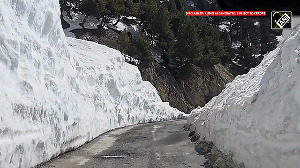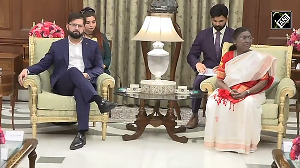It is hard not to feel a little sorry for P Chidambaram. He had to contend with a very odd set of cabinet colleagues during his tenure as finance minister in 1996. This time the colleagues are odder still.
Since government is largely about teamwork, it will be interesting to see how things turn out for him. Much will depend on the sort of support he gets from his prime minister. He didn't get any last time.
Neither Deve Gowda nor Gujral -- how does it feel to have such men as your boss, I wonder -- understood what Mr Chidambaram was attempting. In fact, Gujral let him down badly over the manner in which the Fifth Pay Commission's recommendations were to be implemented.
That may not happen this time but, really, how much prime ministerial support can he count on? This is the million-dollar question. No answer is available as yet.
P V Narasimha Rao recently said that he stood "like a rock" behind his finance minister, Manmohan Singh. If so, he must have been a rather shaky rock because within three months of becoming finance minister, in September 1991, Manmohan Singh resigned over the fertiliser subsidy issue. (Rao, however, had turned down his resignation).
The prime minister had failed to back him against two of his own cabinet colleagues, who would not support any increase at all. One of those is back now and remains as populist as ever.
Mr Chidambaram is made of sterner stuff and will not quit easily. But it will take all his will power to, as the Americans say, hang in there. One wishes him luck. He is going to need rather a lot of it.
Some of it has already come his way. His predecessor, Jaswant Singh, has left him in clover. Mr Chidambaram has been gracious enough to acknowledge this. But, as everyone knows, it takes very little time to run through legacies.
The forex reserves could begin to trickle away, especially if the external affairs minister continues to irritate the US with such single-minded devotion.
With the Left in full flow, strikes could happen. High oil prices could end low inflation. Mani Shankar Aiyar, the petroleum minister, has already said that the government is not going to raise the price of petrol, diesel, kerosene and LPG.
Political compulsions could increase revenue expenditure and therefore the revenue deficit. In fact, with divestment cancelled, this is certain. The only question now is by how much.
In coalition cabinets, as Yashwant Sinha discovered, disasters lurk behind every file, especially in the beginning when everyone is trying out for size. It takes supreme prime ministerial tact, guile and determination to remove the veto and the accompanying demand that everyone sports in his or her pocket.
Dr Singh and Mr Chidambaram will have to deal with several of these vetoers, often simultaneously. Sharad Pawar, Laloo Prasad, Ram Vilas Paswan, T R Baalu, Dayanidhi Maran are all members of the Cabinet Committee on Economic Affairs. And as only three members of the CCEA are from the Congress, they are in a majority.
Mr Vajpayee's CCEA had 14 ministers, 9 of them from the BJP. That made a difference when it was sought which, in the beginning, was not often.
Jaswant Singh was very lucky. He came into the finance ministry towards the end of the NDA government. By then Mr Vajpayee was in full control. Manmohan Singh is not, at least not yet. With the No 10 factor, he may never be.
Whence the biggest similarity between this government and the NDA -- if Mr Vajpayee had to contend with the Sangh Parivar, Dr Singh and Mr Chidambaram will have to contend with "The Parivar" at No 10. This could become their main problem.
In this government, elements like Laloo will want the lion's share of the extra spending, either for their own states or for increasing the subsidies that their ministries dole out. This is precisely where the prime minister's support would be needed.
It would be very surprising if it was forthcoming in the measure required. He knows that a dog with a bone in its mouth doesn't bark.
For the first three years, Mr Vajpayee also did not support his finance minister, who was left to twist slowly in the wind. The result of being thus abandoned was that Mr Sinha ended up doing a lot of damage to the economy -- mostly, he says, against his will.
In that sense, the NDA government and this one are almost identical. Amongst other things, they are the first ones where the finance minister is starting from a weaker position than his cabinet colleagues.
This is because of two reasons. One, in both, to start with the prime minister was not fully in control. And, two, the political weight of Mr Chidambaram is equal to that of Mr Sinha, somewhere around zero but not negative.
Taken together this adds up to a great structural weakness in this government. Never have the PM and the FM combined been as weak as this. That is why shoulders are drooping. You can forget about investment as long this weakness persists.
But it need not, as we saw in the NDA government. There are two ways out of the problem. One is that, in due course, the country gets a new prime minister. There was a time, around 2001, when the first almost happened in the NDA government.
Or, alternatively, the one in office succeeds in gaining full control as Mr Vajpayee did. He cleverly used the NDA allies against his opponents to do this. Will Manmohan Singh be able to do the same thing? If he does, it will be as big a surprise as his becoming prime minister.
But that is in the future. For the moment, the NDA legacy has given Mr Chidambaram considerable room for manoeuvre. Only one finance minister before this, V P Singh, enjoyed a similar luxury, albeit on a much smaller scale. And he was very effective as long as he had the prime minister's support.
This means that Mr Chidambaram doesn't have to do anything other than give a long winded speech. But he need not raise taxes or even try to cut subsidies this time. All he has to do is to simply re-present Jaswant's Singh's interim budget after attaching a few knobs and bells to it.
If nothing else, it will be consistent with the minimum part of the Common Minimum Programme.





 © 2025
© 2025